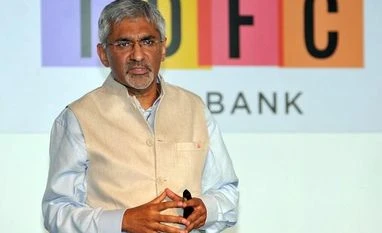Why did the deal fall through?
We couldn't arrive at a relative valuation despite best efforts. That's why we decided to discontinue discussions and terminated the exclusivity arrangement that we had signed effective immediately. We are free to talk to anybody. We entered into an exclusivity period to explore the potential combinations and permutations in the interests of a strategic merger. There was no agreement on either the specific transaction structure or on the valuation.
What was the valuation you offered?
That's out of the public domain, I don't want to get into that.
What was the basis of the merger discussion?
The heart of the proposed conversation was the merger between IDFC Bank and Shriram City Union Finance (SCUF), which would accelerate retailisation of the bank, and the rest were secondary aspects.
Also, there was no valuation when we held the press conference in July. The impression a lot of people get is that there was a structure, and people were making assumptions about the valuation and dilution, but that is not correct. Our objective was to be transparent and meet regulatory disclosure requirements. The Reserve Bank of India was also fine with the deal.
The deal was complex and not many were hopeful for it to go through. Your views?
Because of the complexity involved, we extended our exclusivity talks by a month, which was supposed to end on November 8. We were confident of carrying the majority of our shareholders at a valuation that we believe was reasonable and fair. That is the offer that we made to Shriram Capital shareholders, but we never got a formal counter-offer from them. That's presumably because their shareholders could not get comfortable with our ask. We were hopeful that their shareholders might relent and I suspect they were expecting that we might be more accommodating. But we were consistent and firm that it was a fair valuation and a win-win for everybody. As this was not happening, we decided to call it off.
Why were you reluctant to improve the offer?
We did straightforward work, and we said this is what it is. We have been clear about two things. First, this potential merger could generate huge strategic value for both parties over time. Second, you cannot brew a deal without being disciplined about value. Being disciplined means that you must have the discipline to walk away from an opportunity, no matter how strategically compelling it might look if you don't get what you need.
Were you not facing resistance from IDFC shareholders on the merger?
That is not the case. We have been disciplined about not talking to the media until a proper announcement was made. Shareholders have been constructive, and the iterative process led to a constructive alignment from our minority shareholders. Nobody was saying we must get a high value. The IDFC Bank-SCUF merger was relatively straightforward for arriving at a swap ratio as both are listed.
There were complications at the IDFC Ltd-Shriram Capital (SCL) level. IDFC shareholders are much more dispersed while SCL has only four shareholders. Shareholder dynamics at our end would be much more complex. The valuation disconnect arises because IDFC is a listed holding company and SCL is an unlisted holding company. The holding company discount would apply in both cases. Our shareholders agreed that we would not get the theoretical price for the sum of parts, and were willing to accept a certain discount to that. Collating that feedback, IDFC group made a formal offer.
To read the full story, Subscribe Now at just Rs 249 a month
Already a subscriber? Log in
Subscribe To BS Premium
₹249
Renews automatically
₹1699₹1999
Opt for auto renewal and save Rs. 300 Renews automatically
₹1999
What you get on BS Premium?
-
Unlock 30+ premium stories daily hand-picked by our editors, across devices on browser and app.
-
Pick your 5 favourite companies, get a daily email with all news updates on them.
Full access to our intuitive epaper - clip, save, share articles from any device; newspaper archives from 2006.
Preferential invites to Business Standard events.
Curated newsletters on markets, personal finance, policy & politics, start-ups, technology, and more.
Need More Information - write to us at assist@bsmail.in
)